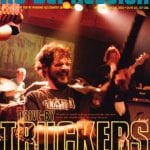Scott Miller – When you write a good song and you know it
In the wake of his mid-late ’90s tenure with the tuneful, playful roots-pop band the V-Roys, Scott Miller has been writing narrative ballads and hook-based roots-rock songs, pleasing audiences across the country with well-paced shows and clever banter — whether he’s performing solo acoustic or with his loose backing crew, the Commonwealth.
Upside Downside, Miller’s second album for Sugar Hill Records since the demise of the V-Roys, employs the trope of being a two-sided LP (the back of the CD separates the songs into six songs each on an “upside” and a “downside”). The ploy may not be novel, but it’s never been more “right” than for the work of this rather complicated guy who can seem a pile of double sides himself.
Raised in Virginia’s Shenandoah Valley in some isolation, Miller is also a scholar of Russian language and literature, attracted to the same passion in Dostoevsky that he found in Civil War histories. Though much of his music could be a soundtrack for partying, he’s spent a good chunk of his life in quiet solitude. Associated with regional music and the south, he’s the son of a southern mother but a Pennsylvania father, and he doesn’t mind touring far and wide from his present hometown of Knoxville. And verbal as he is, he wasn’t necessarily wildly comfortable being asked a lot of questions in an interview.
Miller brings all these dichotomies to the stage, and the friction adds up to a consistent good time from quality material. You also notice, at these shows, a higher preponderance of female audience members than a lot of performers in the roots/Americana vein seem to pull. He’s aware of it.
“I do like to see a parade of healthy hair on women out there,” he told me. “I’m proud that I still get some of them — even though I’m married! And the men follow the women, so they’ll be there too.”
I. IT BREAKS THE RULES TO ASK THE AUDIENCE A QUESTION
NO DEPRESSION: You’ve clearly been able, uncommonly, to hold audiences both as leader of a rock band and alone and acoustic as a singer-songwriter. What are the performance differences between those for you?
SCOTT MILLER: Solo, there are tricks of the trade; John Prine can have a room full of biker summabitches raising hell, but he does “Souvenirs” and they’re crying.
I like to make a lot of noise, but I like to play by myself too. I was only playing solo before the V-Roys; the V-Roys was the first band I was ever in, really. There were lessons that I learned there — but a lot of them got thrown out the window when all of a sudden I was the guy in charge, with even the logistics different, just to get a band where it needs to be so they all play your songs with a smile.
ND: With or without the band, you seem to be a practiced showman.
SM: That may have started in Boy Scout camp. There was one three miles down from the house — as far as my parents would let me go in the summer — and I worked there, making campfires for 11-year-olds. That’s a tough audience!
ND: Anyone who’s seen you perform knows the Scott Miller mantra — “Are you with me?” — that goes out to the audience now and then. What’s the worst response to that question you’ve ever heard?
SM: Silence. I was playing a country fair in Green Bay and I asked it — once. And that was enough. It breaks the rules to ask the audience a question anyway — because they might answer.
ND: How did the years you spent after college working in folk and even bluegrass clubs affect how you interact with an audience now?
SM: In two different ways. At first I was working at a place called “The Prison Coffeehouse” or something, very folk-based — and those audiences were there to hear your songs, kind of quiet. Then I moved to Knoxville and started a gig that I did for four years — at a big old bar called Hawkeye’s — every Wednesday it started out, and then, as the poster said, “every damned Friday.” They had a thing called “Animal Hour” between 9 and 10, where you got three shots for one.
ND: A solo acoustic performer’s dream! This may explain a lot.
SM: Yeah; I could get pretty fuckin’ loud! My songs were really obnoxious and timely and I guess had some shock value to them. They weren’t exactly the kind of songs that a man could play for the rest of his life! I’d do these for four hours straight with no breaks — from 1990 to 1994.
ND: There’s still a change-up “picking” side to what you do, even behind a sometimes raucous band like the Commonwealth.
SM: That’s probably just my limitation as a musician. Where I grew up, there was bluegrass, but there were no rock ‘n’ roll bands, and nobody around to play. We were so isolated in the valley that the band I saw more than any other was Hot Rize — and I was such a stick-in-the mud traditionalist about a lot of things that I liked that.
ND: You’ve been known to praise someone like Pete Seeger for his live shows, which will seem “of another time and folkie” to some.
SM: Yeah — and others like him. What struck me was the songs. People can laugh about some of them, but there was that “Point A to Point B” thing in them that would move me; they bring you some emotion and they take you someplace. For me, it’s all about the song; I try to keep it about that.




